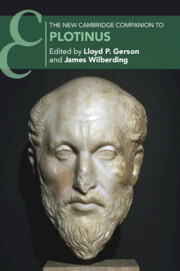Book contents
- The New Cambridge Companion to Plotinus
- Other Volumes in the Series of Cambridge Companions
- The New Cambridge Companion to Plotinus
- Copyright page
- Contents
- Figures
- Tables
- Contributors
- Acknowledgements
- Porphyry’s Arrangement of the Enneads
- Abbreviations of Other Ancient Works and Authors
- Introduction
- Part I Historical Context
- Part II Metaphysics and Epistemology
- Part III Psychology
- 9 The Embodied Soul
- 10 Self-Knowledge and Self-Reflexivity
- Part IV Natural Philosophy
- Part V Ethics
- Bibliography
- Index Locorum
- Index
- Other Volumes in the Series of Cambridge Companions (continued from page ii)
10 - Self-Knowledge and Self-Reflexivity
from Part III - Psychology
Published online by Cambridge University Press: 25 May 2022
- The New Cambridge Companion to Plotinus
- Other Volumes in the Series of Cambridge Companions
- The New Cambridge Companion to Plotinus
- Copyright page
- Contents
- Figures
- Tables
- Contributors
- Acknowledgements
- Porphyry’s Arrangement of the Enneads
- Abbreviations of Other Ancient Works and Authors
- Introduction
- Part I Historical Context
- Part II Metaphysics and Epistemology
- Part III Psychology
- 9 The Embodied Soul
- 10 Self-Knowledge and Self-Reflexivity
- Part IV Natural Philosophy
- Part V Ethics
- Bibliography
- Index Locorum
- Index
- Other Volumes in the Series of Cambridge Companions (continued from page ii)
Summary
Self-knowledge for Plotinus concerns the general features of what it is to be a self – a being capable of such self-relations as self-reflexivity and unified consciousness of one’s activities, both mental and bodily. Besides conducting sophisticated discussions on the structural problems of these relations, Plotinus carries on the Socratic interest in care of the self, or in elevation of oneself towards ideal knowledge and virtue – that is, in self-ennobling. In self-improvement, the role of knowledge is central; self-knowledge will reveal the activities typical for different epistemic conditions. Although Plotinus operates with the metaphysical division of soul, body, and the embodied composite he inherited from Classical Greek philosophers, he reshapes the discussion in two important ways: by concentrating on the soul’s power of self-identification – of choosing or attending to itself – and on the way different cognitive activities include a self-reference.
- Type
- Chapter
- Information
- The New Cambridge Companion to Plotinus , pp. 241 - 264Publisher: Cambridge University PressPrint publication year: 2022
- 1
- Cited by

